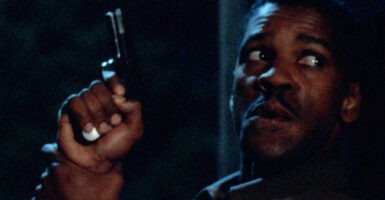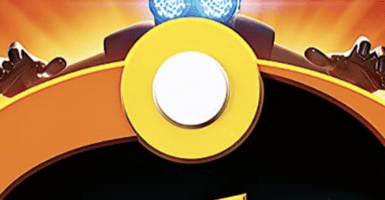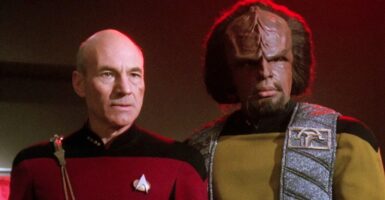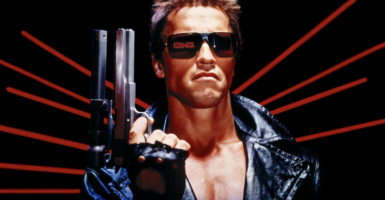Ender’s Game Director Gavin Hood Sounds Off On The Sad Irony Of Orson Scott Card’s Anti-Gay Stance
This article is more than 2 years old
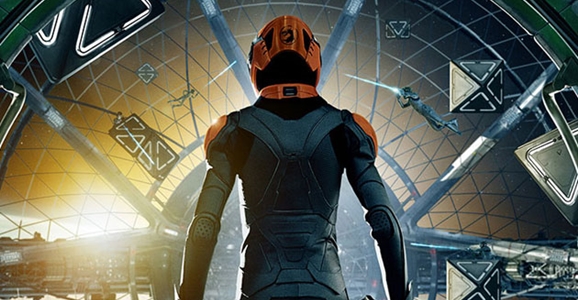 I’ll give them this, the people behind Lionsgate’s upcoming adaptation of Ender’s Game aren’t shying away from the controversy inherent in basing their movie on the work of an author with a well-known anti-gay stance. Then again, they don’t really have much of a choice. No one is going to let this one drop, and now director Gavin Hood (X-Men Origins: Wolverine) addresses these issues in a new interview.
I’ll give them this, the people behind Lionsgate’s upcoming adaptation of Ender’s Game aren’t shying away from the controversy inherent in basing their movie on the work of an author with a well-known anti-gay stance. Then again, they don’t really have much of a choice. No one is going to let this one drop, and now director Gavin Hood (X-Men Origins: Wolverine) addresses these issues in a new interview.
Talking to lesbian, gay, bi-sexual, and transgendered centric magazine The Advocate, Hood calls Card’s oft-stated, rather hateful stand on gay rights, especially gay marriage, “dreadfully ironic.” This is in regards to the themes and subject matter of Orson Scott Card’s novel. He says, “Orson wrote a book about compassion, and empathy, and yet he himself is struggling to see that his position in real life is really at odds with his art.”
Hood continues, “Great art usually rises above the weaknesses and failings of its creators.” In this case especially, these words ring very true. Reading the novel, you would never think that the man who wrote it is a raging homophobe who viciously rails against the rights of a huge worldwide population. In fact, you’d probably guess the exact opposite. Ender’s Game is all about marginalized individuals coming together, about people banding together, finding inner strength, and persevering through hard times. The struggles Ender, played by Asa Butterfield in the film, faces are similar to those experienced by kids growing up every day, gay and straight.
As Hood says:
The story of Ender is really a young person in search of his identity and in search of his own moral compass…It is so ironic that the writer of the work that has helped so many [young] people, gay and straight, to find empowerment, to feel empowered, to find their own moral compass — it’s very sad that he, himself, is struggling with these issues.
Lionsgate has gone to great lengths to distance themselves from Card’s politics. Recently they announced that they will hold a benefit premiere of the movie, with all the proceeds going to help support LGBT causes and groups. This is after Card issues a statement calling the issue of gay marriage moot (despite the fact that it is only recognized in 13 states), and asking for tolerance from groups he has repeatedly proven to be intolerant of (he has repeatedly called for the criminalization of homosexuality).
Despite Lionsgate and Hood’s best efforts, numerous groups are calling for a boycott of the film when it hits theaters on November 1. The biggest of these is Skip Ender’s Game, a name that cuts straight to the heart of the matter. Hood says, “I fully understand the position of those seeking a boycott. I really do,” but continues to say that he hopes his film, and all of the added attention, provides a context to further discussion and debate on the topic, rather than simply keeping viewers away.
Ender’s Game is a story that has spoken to generations of young science fiction fans. Regardless of sexuality, you can identify with Ender’s tumultuous path in life, struggling to find a place, being bullied because he’s different, and standing his ground no matter the consequences. Many have even suggested that the story works best if you interpret the protagonist as a gay character. Card must love that, especially because this reading isn’t much of a stretch. While Ender is close with Petra, they’re solely friends, and the only female character he shows any affection for is his sister, Valentine. He shares the deepest, most emotional connection with Alai, a fellow recruit at Battle School, a boy who kisses him at one point. Like all art, Ender’s Game is open to interpretation. As the consumer bring your own experiences and worldview along for the ride as you decrypt the text for yourself, and you make of it what you will.
This brings up the age-old debate of can you separate the art from the artist. In some cases that is easier said than done, especially if you know nothing about the creator. That song, book, movie, or TV show you love, may very well have been made by a terrible, terrible person, but in many cases you can accept the artifact on its own merits. People talk all the time about how works of art stand alone. Artists certainly have their own intentions when creating, but in the end, you, by standing there looking at a painting, reading a book, or watching a movie, create it for yourself, and find meaning where you will.
I don’t mean to imply that ignorance is bliss, but Card certainly makes it difficult, if not impossible, to continue to enjoy his work. I don’t want to support him, or inadvertently contribute any money to groups that I absolutely despise on very fundamental levels. On the other hand, the story still resonates with me—though I’ll never be able to read Ender’s Game the same way again, knowing what I know now—and I’m curious to see the adaptation. It’s not an easy situation, and it’s one that I’m still debating with myself.
Hood, Lionsgate, and everyone else involved in Ender’s Game, certainly hope that movie going audiences will be able to look past Card’s homophobia come November. They’ve taken great pains at every opportunity to state, restate, and bellow from the mountaintops, that they hold the polar opposite views of the guy who wrote the book. We’ll see how that strategy works out for them, if audiences will give them a chance, or if they’ll stay away.



